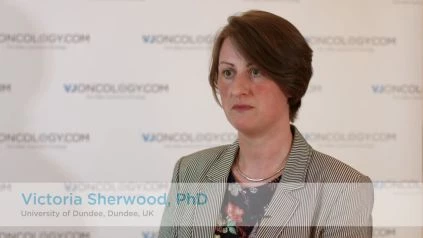Victoria Sherwood , PhD of the University of Dundee, Dundee, UK, talks about the next steps for the research into Wnt signalling at the 2016 World Congress on Cancers of the Skin (WCCS) and the Congress of the European Association of Dermato-Oncology (EADO) in Vienna, Austria. Dr Sherwood begins by saying that the understanding now of why Wnt signalling has different effects in melanoma tumors could be potentially dependent on p10 expression. Therefore, more clinical studies must be done to try and understand whether or not, p10 expression if it is high and there are high levels of Wnt ?-catenin signaling, could be a good prognostic marker for outcome for patient survival. Dr Sherwood then talks about how if this work is taken on in more clinical studies, it will allow us to understand how we can intervene with more specific drugs. There are a number of drugs that have been developed that are in clinical trials for Wnt inhibition. She explains that it is difficult to know how to use those drugs in the treatment of melanoma given that there are controversies in the literature. It may now indicate that patients that have low levels of p10 where wnt ?-catenin signaling seems to be promoting a pro migratory and metastatic phenotype, those drugs can be introduced into those patients so p10 may be a potentially useful marker for intervention with Wnt inhibitors.
[the_ad id="32629"]

